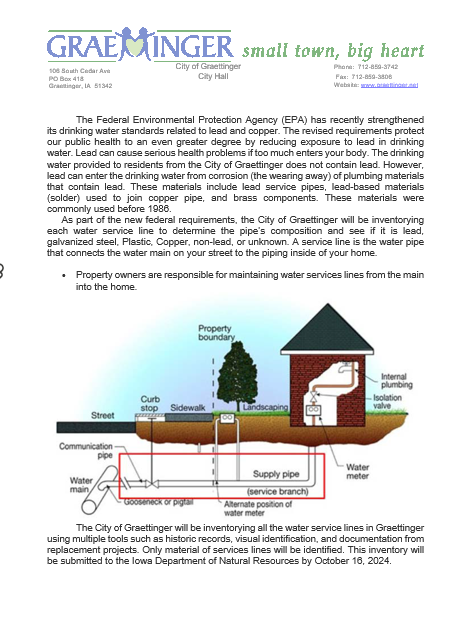Graettinger Municipal Water is focused on protecting the health of every household in our community. A notice was recently sent contains important information about your drinking water. Please share this information with anyone who drinks and/or cooks using water at this property if you received a notice. In addition to people directly served at property, this can include people in apartments, nursing homes, schools, businesses, as well as parents served by childcare at this property. Graettinger Municipal Water has determined that a portion or the entire water pipe (called a service line) that connects your home, building or other structure to the water main is made from galvanized material and may have absorbed lead. EPA has defined these service lines as “galvanized requiring replacement”[1]. Our records either indicate that lead service line pipe may be present or might have been present in the past. If you have information that could help us better describe your service line, contact us at (712) 859-3742, or email at graettinger1893@rvtc.net .
Galvanized service lines that have absorbed lead can contribute to lead in drinking water. People living in homes with a galvanized service line that has absorbed lead may have an increased risk of exposure to lead from their drinking water.
Health effects of lead
Exposure to lead in drinking water can cause serious health effects in all age groups. Infants and children can have decreases in IQ and attention span. Lead exposure can lead to new learning and behavior problems or worsen existing learning and behavior problems. The children of women who are exposed to lead before or during pregnancy can have increased risk of these negative health effects. Adults can have increased risks of heart disease, high blood pressure, and kidney, or nervous system problems.
Steps you can take to reduce lead in drinking water.
Below are recommended actions that you may take, separately or in combination, if you are concerned about lead in your drinking water. The list also includes where you may find more information and is not intended to be a complete list or to imply that all actions equally reduce lead in drinking water.
Use your filter properly. Using a filter can reduce lead in drinking water. If you use a filter, it should be certified to remove lead. Read any directions provided with the filter to learn how to properly install, maintain, and use your cartridge and when to replace it. Using the cartridge after it has expired can make it less effective at removing lead. Do not run hot water through the filter. For more information on facts and advice on home water filtration systems, visit EPA’s website at https://www.epa.gov/water-research/consumer-tool-identifying-point-use-and-pitcher-filters-certified-reduce-lead. Clean your aerator. Regularly remove and clean your faucet’s screen (also known as an aerator). Sediment, debris, and lead particles can collect in your aerator. If lead particles are caught in the aerator, lead can get into your water.
Use cold water. Do not use hot water from the tap for drinking, cooking, or making baby formula as lead dissolves more easily into hot water. Boiling water does not remove lead from water.
Run your water. The more time water has been sitting in pipes providing water to your home, the more lead it may contain. Before drinking, flush your home’s pipes by running the tap, taking a shower, doing laundry, or doing a load of dishes. The amount of time to run the water will depend on whether your home has a lead service line or not, as well as the length and diameter of the service line and the amount of plumbing in your home
Learn about construction in your neighborhood. Contact us at (712) 859-3742, or email at graettinger1893@rvtc.net to find out about any construction or maintenance work that could disturb your service line. Construction may cause more lead to be released from a lead service line or galvanized service line if present.
Have your water tested. Contact us, your water utility, at (712) 859-3742, or email at graettinger1893@rvtc.net to have your water tested and to learn more about the lead levels in your drinking water. Alternatively, you may contact a certified laboratory to have your water tested for lead. Note, a water sample may not adequately capture or represent all sources of lead that may be present. For information on sources of lead that include service lines and interior plumbing, please visit https://www.epa.gov/ground-water-and-drinking-water/basic-information-about-lead-drinking-water#getinto.
Replacing lead service lines
Contact an excavator or Graettinger Municipal Water at (712) 859-3742, or email at graettinger1893@rvtc.net about replacing lead and galvanized service lines.
If you are planning on replacing the portion of the service line that you own, please notify us at (712) 859-3742, or email at graettinger1893@rvtc.net .
For information about potential financing solutions to assist property owners with replacement of lead service lines, please contact us at (712) 859-3742, or email at graettinger1893@rvtc.net .
For more information on reducing lead exposure from your drinking water and the health effects of lead, visit EPA’s website at http://www.epa.gov/lead.
Contact the Iowa Department of Public Health. Contact your county or state health department if you have concerns about health effects caused by lead.
Refers to a galvanized service line that is or was at any time downstream of a lead service line or is currently downstream of a "Lead Status Unknown" service line.

